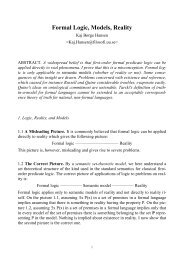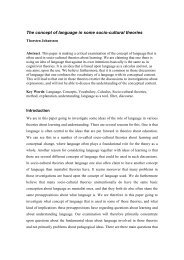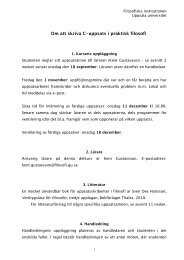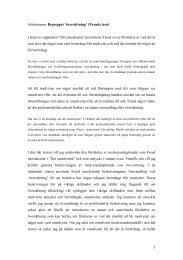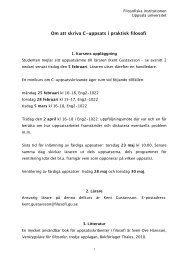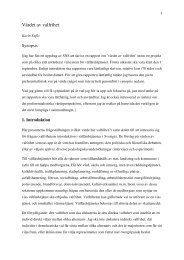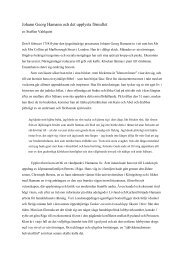1 Dewey, Wittgenstein, and Linguistic Instrumentalism My paper ...
1 Dewey, Wittgenstein, and Linguistic Instrumentalism My paper ...
1 Dewey, Wittgenstein, and Linguistic Instrumentalism My paper ...
Create successful ePaper yourself
Turn your PDF publications into a flip-book with our unique Google optimized e-Paper software.
eference. Immanent meanings provide a richer underst<strong>and</strong>ing <strong>and</strong> appreciation of an<br />
otherwise cold proposition. They are the unity not just of the thought that went into<br />
arriving at the conclusion or reference, but also of the feeling <strong>and</strong> action. It is largely a<br />
matter of distinguishing linguistic reference from an embodied, habitualized, <strong>and</strong> felt<br />
consummatory qualitative experience of the self in practical dynamic unity with the<br />
world, which the reference provides as an aid to coordinating our activity. 3<br />
While an ardent anti-dualist, <strong>Dewey</strong> is always willing to support subtle<br />
distinctions as long as we do not hypostatize them. Here is a particularly relevant<br />
example where he distinguishes among three aspects of experience:<br />
It is not possible to divide in a vital experience the practical, emotional, <strong>and</strong><br />
intellectual from one another <strong>and</strong> to set the properties of one over against the<br />
characteristics of the others. The emotional phase binds parts together into a<br />
single whole; “intellectual” simply names the fact that the experience has<br />
meaning; “practical” indicates that the organism is interacting with events <strong>and</strong><br />
objects which surround it. (LW 10: 61)<br />
Instrumental, referential, or what <strong>Dewey</strong> calls “significant” meanings emphasize the<br />
intellectual component of vital experience, while immanent meaning includes the other<br />
two phases in proper dynamic equilibrium. Immanent meanings involve an<br />
underst<strong>and</strong>ing, appreciation, perhaps even an enjoyment that depends on the prior<br />
achievement of objective intellectual reference. Because they are not cognitive, the<br />
affective <strong>and</strong> practical features are, in themselves, inarticulate. At best, words may only<br />
gesture toward them, yet they matter immensely in the wise conduct of life.<br />
2



